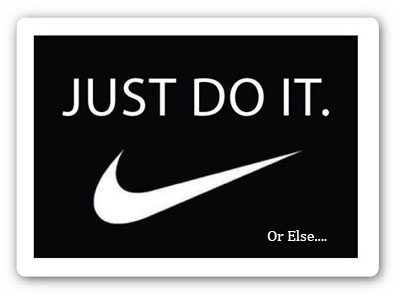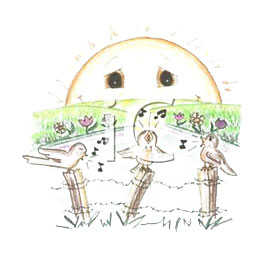After being hired as a visual basic programmer, the early part of my career, for a year or so, involved doing multiple odd jobs besides programming . Ranging from managing servers, installing updates, configuring exchange server, working on database administration and last, but not the least formatting documents.

What this meant was that this was my training time for playing a one man army if the need existed in my future projects.
What this also meant was that on any given time I was reporting to and working with more than half a dozen project managers and their egos. Everyone had a high priority work item for me. Everyone was offended if their high priority work item wasn't addressed before the other manager's high priority work item.
It was multitasking at it's height. I was juggling five tasks and five egos simultaneously on any given day. Missing a task was acceptable, missing to attend to or honor a manager's ego was not. I remember for example, forgetting to place a comma in the right place while updating the content on the content management server and having that issue bite me back in the form of a nasty email from one of my managers. This manager of mine went the extra mile at embarrassing me by copying multiple people in the team.
I suspect the issue had more to do with me not paying enough attention to that manager's commands than it had to do with me missing out the comma. I had spent more time fixing a server that had gone down than I had updating the content in the Content Management Server. Something that this manager had probably taken a note of and then taken care of by writing this email.
The height of it was me getting called into the office of another one of my managers. This gentleman was offended because I had filed just two hours a day of my work time to his project and the rest of the time had been filed to other projects. After my desperately trying to explain to this gentleman that all the work had been done in the two hours that I filed, I was ordered to immediately redo all my time sheets and file eight hours a day to his project. By the end of the month, I was filling timesheets which basically said that I was working twenty four hours a day. Nobody cared.
Multiple clients were billed for my work, each seeing just the hours that I filed to their projects. No one, neither the HR, nor the management noticed anything peculiar about someone working twenty four hours a day. Or maybe they did and I started receiving pats on my back for being a hard working employee. Working for twelve to sixteen hours and filing twenty four was my first realization that the number of hours you put in your work means nothing. Your effectiveness means everything.
I've talked about this topic before. Scott Berkun touches this topic while talking about managers who are never around. He explains:
Everyone in the tech-sector goes through a phase early in their career where they're proud of their hours. At software and consulting companies everywhere, circles of 20 something friends debate, over drinks each night, who's put in crazier hours – "I worked 70 hours last week", "70? I worked 70 hours in 3 days." "3 days? I worked 70 hours this morning, before breakfast." And on it goes.
It's a kind of dumb male pride in size of things, rather than quality or, god forbid, actual happiness. To work 70 hours is a statement of work, not of progress. For every idiot working 70 hours there's a smarter, wiser man who's doing the same amount of work in 50 because he's paying more attention to results than the clock. I'd rather be, and rather hire, that man.
Sadly enough, years ago, for me this realization did not come from watching this super efficient man that Scott talks about or learning from him, but from working with managers who deeply believed in measuring efficiency by looking at your timesheets and seeing how many hours you spent on their projects. More hours, it was believed, was better than less. Back in those times, for me, working smart and doing work which could be filed as, and billed as, twenty four hours of work, in twelve was not a just philosophical thought. It was practical necessity more than anything else. There were two reasons for this.
The first was that after a few months of putting in twelve to sixteen hours a day I had started burning out.
The second was a much more real and practical reason. I was in college back then, and my graduation exams had started nearing. To make things worse, I had also taken up a few vendor certifications which had to be completed. Spending twelve to sixteen hours a day at work meant that I would be able to do none of these items nicely. I had to figure out a way to get enough time to study.
The realization that I could work twelve to sixteen hours a day and file timesheets which showed twenty four hours of work and have these timesheets get approved was a profound one. I had found a hole in the system. A rather scary hole but one that would be used and exploited to its limits. The realization meant that excelling in this organization was all about:
- Working smart.
- Pretending that you were working really hard.
Automated word macros that format a huge part of the documents were setup. Automated scripts were set up for odd jobs that I had been assigned to do. Every single work item that was repeatable had been taken and scripted to a level where my manual intervention would be minimum. Very soon I was working for four to six hours a day and filing timesheets for twenty four. A good 50% of this four to six hours went in juggling with people's egos. The rest of it was real work. For the other hours I would sit quietly at my desk, a book or a PDF open and I would study. Most people passing by assumed I was working really hard.
The creepiest twist to the tale of events came when I took a study leave for my final graduation exams. By this time everyone believed that the tasks I was doing were worth about twelve to sixteen man hours a day and so they went ahead and assigned another person on the project. While I was on a leave two rather strange incidents happened.
The first was that the person who had been assigned to the project had complained that he was overworked and that he was not being able to finish his daily assignments. He ran into a lot of arguments in turn building up some friction between all of these project managers, which was fun to watch when I came back.
The second strange incident was a call I received from one of my managers, "Hey, thanks for working from home while you are on leave, but you know, we are assigning someone else to this project and you do not have to work from home when you are on a leave", he had said.
What had happened, I assumed was that one of those scripts that was supposed to have automated some of my work had kicked in, completed the job and had sent out an email that the task had been completed from my email account. For a few days, I contemplated telling him about the scripts to improve the overall efficiency of the team but then, that would have shattered my image as a hard worker who was putting in sixteen hours a day and was also working from home. So I decided to stay put, shut up and just shut down the script scheduler till the time my study leave was over, letting the substitute bitch about how overworked he was and allowing him to continue doing most of these tasks manually.
These series of events taught me two very important lessons:
- Recognize results people produce (quality of work, art, happiness, the culture they create, innovation) not the brute force effort without any returns that idiots put in their work. Any idiot can pretend that he is working really hard. It takes a kickass team to be effective and produce working software.
- Don't try to squeeze out every minute of someone's free time. If someone is working smart and getting more work done in less time, don't make it your responsibility and your sole mission in life to keep the guy busy with more work. Efficient guys, find out work for themselves and they get down to doing it, even if you are not after them. Get out of their way and Leave them alone.
Do these two long enough and what you start seeing is sheer magic. People develop trust in you. They start sharing their ways of working smart, their shortcuts, their innovation and their approaches with the rest of the team and the organization in turn making everyone more efficient. Once the tables are turned and male egos revolve around how efficiently you can do your work, the man hour discussion pretty much moves out of the picture. That is when you start building a culture that revolves around sound time management, innovative working techniques, efficiency and results.
If you can't build that culture, most of your organizational efficiency is in isolated corners of your office corridors and you probably don't know anything about it.
What is rather ironic is that my first lessons of time management and efficiency came from an environment that was designed to screw any engineer working in that environment and turn that engineer into an automaton executing programmed directions for sixteen hours a day.
But then, you learn most of your management lessons in the strangest of circumstances and by hacking the weirdest of work environments.






Comments are closed.